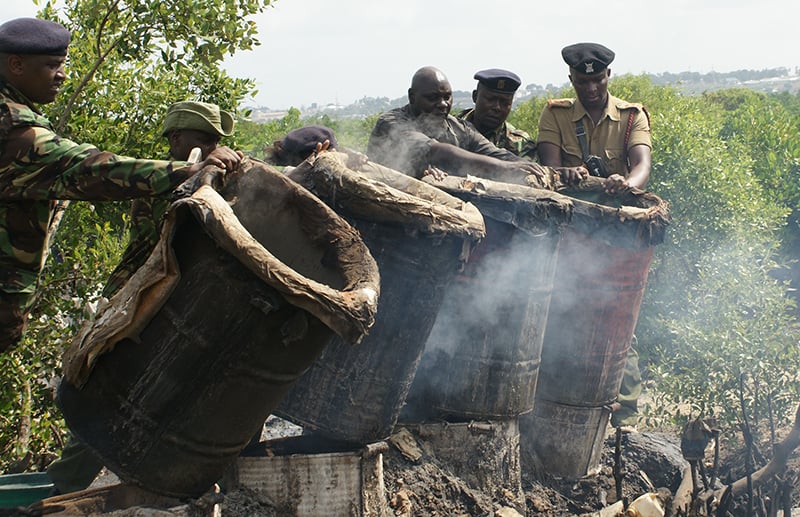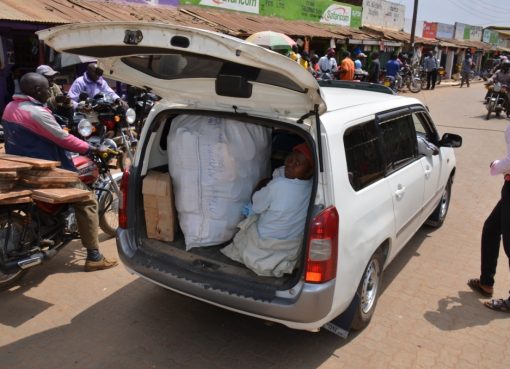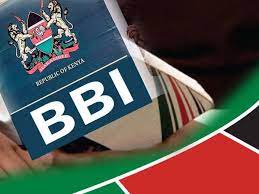Rift Valley Regional Commissioner Maalim Mohammed has launched a 100-day Rapid Results Initiative (RRI) to get rid of counterfeit alcoholic drinks, illicit brews and narcotic substances in the region.
According to Mr. Mohammed, the RRI programme seeks to enforce compliance with the national standards and other regulations, eliminate illicit and counterfeit alcoholic drinks and educate the public on the dangers of the drinks and narcotic substances.
The Multi-Agency operation which takes effect immediately will be extended to bar operators licensed by county governments and high end wholesale and retail outlets as it has emerged that counterfeiters are also targeting expensive alcohol brands in the market.
“In the past, authorities have been training their eyes on cheaper brands, but we will not be thrown off track by fraudsters counterfeiting premium and luxurious whiskies, brandy and vodka. Dealers in fake products are also increasingly targeting far-flung villages. We will tighten surveillance in major towns and even if they go to remote areas, we will pursue them,” affirmed the administrator.
The Kenya Revenue Authority (KRA) has documented several cases where illegal manufacturers have been packaging substandard alcohol in premium brand bottles complete with KRA excise stamps and even manufacturer and distributor batch numbers even as the latter disowned some of the brands insisting the batch numbers were fake.
In an interview held by Kenya News Agency at his office, Mohammed said besides posing serious public health and safety challenges, the illegal dealers in the alcoholic beverages industry do not pay tax and thus deny legitimate players a level-playing ground and economy the much-needed revenues to grow.
Statistics from the Kenyan Revenue Authority (KRA) indicate that local manufacturers lose $42 million (Sh5.1 billion) to counterfeiters while the government loses $80 million (9.75 billion) as potential tax revenue yearly.
The Regional Commissioner indicated that some of these illegal businesses further drive other forms of crime such as money laundering, drug trafficking, petty crimes and terrorism.
“President William Ruto has pronounced himself very clearly on his resolve to fight against counterfeit goods, illegal brews, fake stamps and uncertified products that are harmful. We are leaving nothing to chance in ensuring that his directive that those taking part in such unscrupulous businesses are dealt with promptly is implemented to the letter,” added Mohammed.
Mohammed said the RRI Initiative will rope in officers from National Government Administration Office (NGAO), the National Police Service (NPS), Kenya Revenue Authority (KRA), Anti-Counterfeit Agency (AFA), and the National Authority for Campaign against Alcohol and Drugs Abuse (NACADA) the Directorate of Criminal Investigations (DCI), local administrators, and the Kenya Bureau of Standards (KEBS).
He called on other arms of the government to work harmoniously in complementing the fight against counterfeits, illicit brews and drug abuse.
Mohammed directed the 14 County Commissioners from the region, as the chairmen of security committees in their areas of jurisdiction, to implement structures for taming the menace.
The County Commissioners have been instructed to make records on progress of the crackdown on a daily basis and file the returns in their respective jurisdictions on a weekly basis to the Regional Commissioner’s office.
“I have directed all the County Commissioners in the Rift Valley region to collaborate with security and investigative agencies to map out the dens of this illicit trade in their regions and smash them. I have also advised them to profile notorious offenders. Any Commissioner who does not know his/her job in safeguarding the social and economic wellness of this country can only be a joy rider in matters of governance,” he said.
He said that mainstream traders who pay taxes have been complaining about competition with illicit businesses for a long time.
“We should conduct an audit of how this is being addressed at the county level. We should not have a business environment that pits illegal trade against legal trade. The virus should be dealt with at the county level,” he said.
Mohammed said the government had every reason to deal with those in the illicit liquor trade as they had no value chains, further limiting economic impact.
The administrator noted that the proliferation of cheap and illegal liquor, whose supply and consumption tends to rise sharply towards Christmas and New Year festivities called for strategic and sustainable efforts to fully eradicate illicit alcohol in future.
He warned that any administrator caught receiving or soliciting bribes from the brewers and sellers, thus compromising the war on illicit brews, will be subjected to disciplinary action.
The Regional Commissioner observed that in their quest to make quick money, the manufacturers of the illicit brews spike the concoctions with deadly industrial chemicals such as methanol and food-grade ethanol to make them more potent and desirable to consumers.
“The crackdowns on illicit brews have been done successfully in the past but lack of continuity has given room for resurgence. This time it will be a continuous process until the region is clean of the brews and drugs,” he added.
He decried an increasing number of bars in residential areas, which he said were now outnumbering schools.
When giving out the new licenses, Mohammed said that relevant authorities should liaise with the Kenya Bureau of Standards, the Kenya Revenue Authority and all other regulatory agencies.
He sounded a tough warning to drug dealers in Rift Valley, saying they would be rounded up and punished in the fresh crackdown by the government.
“All those who have been involved in ruining the lives of millions of our youth in this Region, have nowhere to hide, anymore. We will crack down on them until we completely eradicate this drug menace and deal with those behind it,” he added.
By Anne Mwale





